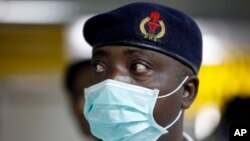The emergence of the Ebola virus in the United States has raised concerns about whether the U.S. should restrict travel from affected West African nations.
The State Department says when it comes to granting visas, the safety and security of the United States is the top priority.
Spokeswoman Jen Psaki said it actually would be counterproductive to limit visas for people traveling from the West African countries affected by Ebola
“The WHO [World Health Organization] and the CDC [Centers for Disease Control and Prevention] have not recommended that we cut off travel from these countries because it remains essential that the world community engage in order to help the affected countries address and contain this health crisis,” she said.
That policy, however, is being questioned by Mark Krikorian, the head of the Center for Immigration Studies, a group that has been critical of U.S. immigration policy.
In particular, he said, a visa should not have been granted to Thomas Duncan, a Liberian national who is now being treated in the U.S. for Ebola.
“A single, unemployed man from a high overstay country that is actually experiencing an outbreak of disease, which would induce people not to return, who also have many relatives here, is almost the test case for a visa overstayer,” said Krikorian.
He says travel from the affected West Africa region to the U.S. should be restricted temporarily.
"I don't even understand why we are debating this. It should have been one of the first things that this administration did," said Krikorian.
Psaki said the U.S. is focusing on other measures to help stop the spread of the epidemic.
“Some nationals of all three Ebola-affected countries are now or will soon be traveling to the United States for training on how to treat Ebola patients on essential measures and of course we have foreign nationals going there as well,” said Psaki.
She said this travel is needed to ensure that individuals have access to proper training and medical equipment.




